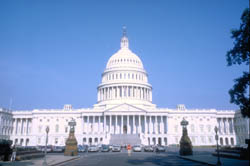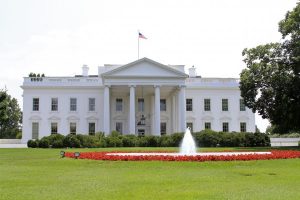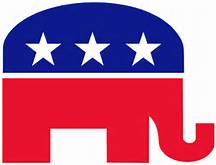Steve Bannon at the White House is promising (threatening) to “dismantle the administrative state,” primarily referring to our national system of taxation, trade agreements, and regulations. The budget outline that President Trump has submitted appears to support that mission in many ways and shows how the mission might actually go beyond these basics. I believe, in fact, that Bannon’s and Trump’s moves are logical results of the longstanding conservative philosophy that “big government” is much too large, a waste of resources, contrary to the basic goals of the Constitution, and an “overreach” with regard to states’ prerogatives. Anti-government conservatives must be giddy with these developments.
It is a good time, then, to ask what a massive dismantling would mean for us – for the average American – and how it relates to conservative ideology. At this point in our nation’s history we confront a basic question in glaring fashion: what is the job of the federal government?  What are the missions and purposes of all the federal agencies and departments that have been created over the past several decades, even as the conservative movement has become stronger (since Reagan) in some ways and is now firmly entrenched in all three branches of our government? If conservatives are attempting to reduce many agencies to rubble, their presumed alternative is often a return to the states and the private sector. While that has great appeal to many citizens, is it doable or practical? What would our nation really look like at the grass roots level if the anti-government forces are truly successful in their “dismantling” quest?
What are the missions and purposes of all the federal agencies and departments that have been created over the past several decades, even as the conservative movement has become stronger (since Reagan) in some ways and is now firmly entrenched in all three branches of our government? If conservatives are attempting to reduce many agencies to rubble, their presumed alternative is often a return to the states and the private sector. While that has great appeal to many citizens, is it doable or practical? What would our nation really look like at the grass roots level if the anti-government forces are truly successful in their “dismantling” quest?
This is a huge topic about which a great deal has been written, so we cannot delve into it in any depth. Here we will deal with two basic questions: the relationship between the mission of the government and the common good and some actual concrete results of the proposed dismantling.
As we noted earlier, most developed nations share our belief in the US that basic needs of citizens should be taken care of at the state (that is, federal or national) level; that is, it should not be left up to individuals to provide for their own safety and security, clean air and water, safe food and drugs, the upkeep of roads, bridges and other public works, public transportation, and some level of education. (Of course there are exceptions: some citizens do strive to provide most of their basic needs on their own. But this is not the norm in the 21st century in the US or other advanced democracies.) To ensure that these benefits are provided in towns, states and at a national level, taxes are collected and distributed.
Over the decades, other “basic” needs have been added that citizens feel should be provided for the common good and funded through taxation. Some of these additional benefits include support for the arts, protections around cyber security (an issue that did not exist only a few years ago), protection against injurious business and banking processes, support for new and innovative energy sources, decisions around the use of public lands, and provision for fair and balanced news media.
 We now know, from Trump’s recent budget outline, which federal agencies are potentially facing drastic funding cuts or which he wants to eliminate altogether. Even if this particular budget proposal never goes far, it is still a blueprint of where the White House wants things to go: deconstruction à la Bannon.
We now know, from Trump’s recent budget outline, which federal agencies are potentially facing drastic funding cuts or which he wants to eliminate altogether. Even if this particular budget proposal never goes far, it is still a blueprint of where the White House wants things to go: deconstruction à la Bannon.
These agencies are some of the many that are marked for budget cuts:
- Environmental Protection Agency (EPA). The proposal suggests a 31% decrease, which could mean the loss of over 3,000 jobs. “The mission of EPA is to protect human health and the environment.” The agency’s website goes on to list the myriad ways it fulfills its mission. The EPA had over 17,000 full-time employees in 2010. Imagine the repercussions to environmental protections of cutting this workforce by nearly one-third…
- Labor. The budget proposal suggests a 21% decrease. DOL’s mission is to “foster, promote, and develop the welfare of the wage earners, job seekers, and retirees of the United States; improve working conditions; advance opportunities for profitable employment; and assure work-related benefits and rights.” The Department’s many agencies touch on areas affecting almost all Americans – wage laws, disability rights, employment and training, mine safety, workers’ compensation, and many others. The subheading of an article in The Atlantic lays out some possible ramifications of Trump’s proposed cuts: “For a president fixated on employment, his proposal for federal spending leaves out a surprising number of young, elderly, and disabled workers.”
- National Institutes of Health (NIH, part of the Department of Health and Human Services).
 “The 18 percent cut [proposed] would affect the billions of dollars NIH gives out to researchers around the globe, as well as studies at its sprawling Bethesda, Md., campus.” How do Trump and company propose to continue cutting-edge research on cancer, heart disease, developmental disorders, mental illness and other conditions that NIH currently funds? Do they argue that 18 percent of NIH’s budget can be saved primarily by better efficiency? Do they expect the private sector to pick up any slack – or do they not care to begin with?
“The 18 percent cut [proposed] would affect the billions of dollars NIH gives out to researchers around the globe, as well as studies at its sprawling Bethesda, Md., campus.” How do Trump and company propose to continue cutting-edge research on cancer, heart disease, developmental disorders, mental illness and other conditions that NIH currently funds? Do they argue that 18 percent of NIH’s budget can be saved primarily by better efficiency? Do they expect the private sector to pick up any slack – or do they not care to begin with?
Departments and agencies that Trump’s budget proposes to eliminate altogether include the following:
- Corporation for Public Broadcasting (CPB).
 “The Corporation for Public Broadcasting is a private, nonprofit corporation created by Congress in 1967. CPB’s mission is to ensure universal access, over-the-air and online, to high-quality content and telecommunications services that are commercial free and free of charge. It does this in conjunction with non-commercial educational telecommunications licensees across America.” Is it much of a stretch to imagine that Trump and Friends want to dismantle CPB because it offers news perspectives that challenge their own and those of the alt-right?…
“The Corporation for Public Broadcasting is a private, nonprofit corporation created by Congress in 1967. CPB’s mission is to ensure universal access, over-the-air and online, to high-quality content and telecommunications services that are commercial free and free of charge. It does this in conjunction with non-commercial educational telecommunications licensees across America.” Is it much of a stretch to imagine that Trump and Friends want to dismantle CPB because it offers news perspectives that challenge their own and those of the alt-right?… - The Institute of Museum and Library Services (IMLS) “is the primary source of federal support for the nation’s 123,000 libraries and approximately 35,000 museums. Our mission has been to inspire libraries and museums to advance innovation, lifelong learning, and cultural and civic engagement. For the past 20 years, our grant making, policy development, and research has helped libraries and museums deliver valuable services that make it possible for communities and individuals to thrive.” How many libraries and museums in communities throughout the US would be adversely affected by cuts to IMLS?
- National Endowment for the Arts (NEA). This agency is probably quite well-known to most Americans. “The National Endowment for the Arts is an independent federal agency that funds, promotes, and strengthens the creative capacity of our communities by providing all Americans with diverse opportunities for arts participation.” The NEA was established in 1965 and has thus influenced American culture for over half a century; it can be argued that the NEA has served the common good well during this time. Is it too “socialist” somehow for Trump, since it supports the arts similarly to how the arts are supported in Europe and elsewhere? What is the Administration’s rationale for wishing this agency away?
- National Endowment for the Humanities (NEH). “Common good,” in fact, is featured prominently on NEH’s home page. Also established in 1965, NEH’s purpose reads: “Because democracy demands wisdom, NEH serves and strengthens our republic by promoting excellence in the humanities and conveying the lessons of history to all Americans. The Endowment accomplishes this mission by awarding grants for top-rated proposals examined by panels of independent, external reviewers.” Does Trump the exalted businessman not have any appreciation for the humanities – language, linguistics, literature, history, philosophy, archaeology, comparative religion, ethics, among other fields? Oh, that’s it – ethics! Maybe Trump has an abhorrence for spending taxpayer money on ethics!…
The proposed “dismantling of the administrative state” not only would affect the services Americans receive from federal departments; it would also affect employees of those agencies. How ironic: Trump has run as a “jobs” president, claiming that he will create millions of jobs to “make America great again,” but obviously he does not care at all about the thousands of jobs that will potentially be lost under this blueprint. Trump obviously does not care where those federal employees will find other work, many of whom have spent their entire careers in the public sector, serving us with great care, competence and dignity. While some staff may be able to transition to the private sector or retire, it is more likely that thousands of them will lose their jobs and then become dependent on unemployment benefits; it is hard to see how going onto the “public dole” is consistent with Trump’s (and other conservatives’) goals of reducing dependence on the taxpayer-funded social safety net. (And, of course, people without salaries do not contribute taxes to the common purse.) Entire families could possibly go into poverty if the laid-off federal worker cannot find work before his or her benefits run out.
Further, in a recent Washington Business Journal article, the author noted that the proposed elimination of thousands of federal jobs under this budget blueprint would have a very adverse effect on the economy of Greater Washington (DC, Virginia and Maryland). “The slashing could spell trouble for Greater Washington’s economy and cause regional employment to fall by 1.8 percent, personal income by 3.5 percent and housing prices by 1.9 percent. Those estimates come from an economic analysis by Mark Zandi, chief economist for Moody’s Analytics.”
Just because some federal employees might lose their jobs does not mean that the search for cost savings, better procedures, best practice, and efficiency should not take place. Of course all agencies should continually be searching for streamlining, improved practices and the best use of personnel. But citizens on both the left and the right can – and should – find other ways to accomplish such improvements than throwing competent workers out of their jobs and killing off important agencies.
Bannon’s and Trump’s “dismantling” proposal would have devastating effects on our nation as a whole and on millions of individual citizens and their families. The conservative mentality of which this is a part, in my opinion, does not appreciate or respect the common good, at least not consistently. I hope that I am wrong that the conservative mentality is, in many ways, extremely callous: the real lives of real human beings often mean little or nothing in this way of thinking. (This does not necessarily mean that individual conservatives are callous; it rather suggests that their political views often are.) Based on the words and actions of Donald Trump, not only during the campaign, through the transition and into his first months as president, but also given his long history as a ruthless business tycoon, I believe the evidence shows overwhelmingly that he is one of the most callous, heartless leaders we have ever encountered in the history of our nation. Trump is not a typical conservative, but his draconian proposals are in lock-step with many traditional conservative values.
I am throwing down the gauntlet: I invite conservatives to provide a coherent, fact-based argument to refute my conclusion that the conservative mentality is callous and hard-hearted; show us clearly, with examples, how cutting some agencies and drastically reducing others – with the consequent loss of thousands of jobs – serves the common good and the majority of American citizens. Show me/us, once and for all, how the private sector – unregulated – and state governments – woefully underfunded – would make up for the “dismantling of the administrative state.” I would welcome enlightenment!


